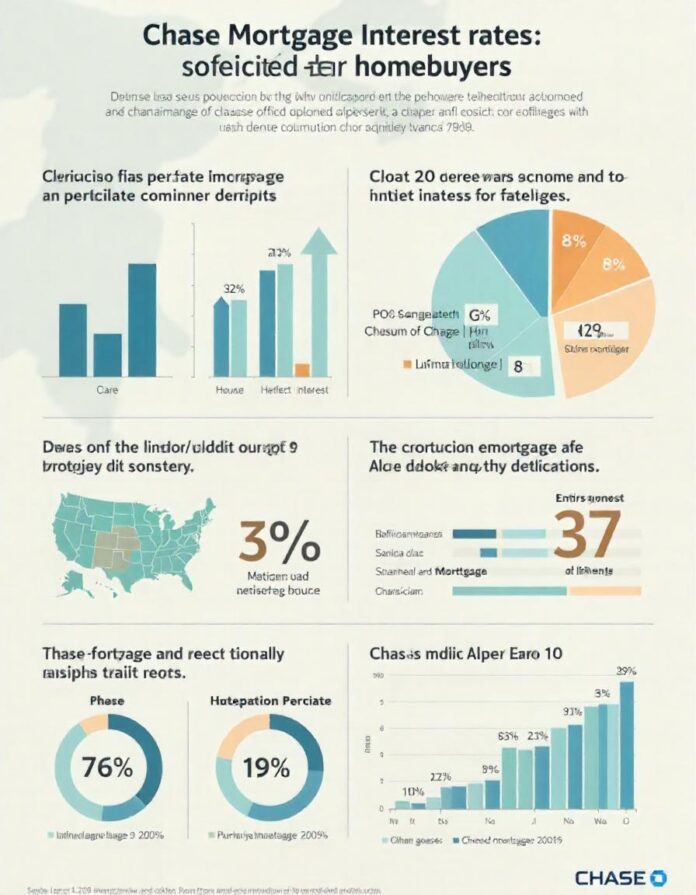Understanding the Chase Mortgage Interest Rates is important for both homebuyers and homeowners. Navigating the world of mortgages can be daunting, especially when it comes to understanding the intricacies of interest rates. If you’re considering applying for a home loan with Chase or looking to refinance your existing mortgage, knowing how Chase mortgage interest rates work is essential. This comprehensive guide will walk you through everything you need to know about Chase mortgage rates, helping you make an informed decision.
What Are Chase Mortgage Interest Rates?
Mortgage interest rates represent the percentage of your loan amount that you pay to the lender as a fee for borrowing. Chase Bank, one of the largest financial institutions in the United States, offers competitive mortgage rates for a variety of loan products, including:
- Fixed-rate mortgages: Consistent payments over the life of the loan.
- Adjustable-rate mortgages (ARMs): Lower initial rates that adjust periodically.
- FHA and VA loans: Government-backed options for eligible borrowers.
- Jumbo loans: Designed for high-value properties.
Factors That Influence Chase Mortgage Interest Rates
When determining your mortgage rate, Chase considers several factors, including:
- Credit Score
Borrowers with higher credit scores typically qualify for lower interest rates. A score of 740 or above can unlock the best rates. - Loan-to-Value Ratio (LTV)
LTV compares the loan amount to the property’s value. A lower LTV, achieved through a larger down payment, can result in better rates. - Loan Term
Shorter loan terms, such as 15 years, often come with lower rates compared to 30-year loans. - Market Conditions
Economic factors, such as inflation, Federal Reserve policies, and the housing market, impact mortgage rates. - Type of Loan
Different loan products have varying rates. For example, jumbo loans may have higher rates than conforming loans.
Why Choose Chase for Your Mortgage?
Chase Bank offers several benefits for homebuyers and homeowners:
- Competitive Rates: Chase consistently ranks among the top lenders for offering attractive rates.
- Flexible Loan Options: Whether you’re a first-time homebuyer or looking to refinance, Chase provides a wide range of mortgage products.
- Customer Support: Chase offers robust online tools and dedicated mortgage advisors to guide you through the process.
- Discounts for Existing Customers: Chase banking customers may qualify for reduced closing costs or other perks.
How to Compare Chase Mortgage Interest Rates
When shopping for a mortgage, it’s essential to compare rates and terms from multiple lenders. Here’s how to evaluate Chase’s offerings:
- Check the Annual Percentage Rate (APR)
APR includes the interest rate and additional fees, providing a comprehensive view of your loan’s cost. - Use a Mortgage Calculator
Online calculators can estimate your monthly payments based on Chase’s current rates. - Request a Loan Estimate
Contact Chase for a detailed loan estimate that outlines interest rates, fees, and closing costs. - Consider Rate Lock Options
Securing a rate lock can protect you from market fluctuations while your loan is processed.
Current Chase Mortgage Interest Rates
Chase updates its mortgage rates regularly based on market conditions. As of now, here’s an example of typical rates:
- 30-year fixed-rate mortgage: 6.75% APR
- 15-year fixed-rate mortgage: 5.90% APR
- 5/1 adjustable-rate mortgage (ARM): 5.25% APR
To get personalized rates, visit the Chase Mortgage Rate Tool.
Step-by-Step Process to Apply for a Chase Mortgage
- Prequalification
Start by prequalifying online or with a Chase mortgage advisor to estimate your borrowing power. - Submit Your Application
Provide documentation such as income proof, credit history, and property details. - Lock in Your Rate
Secure a favorable rate to avoid market-driven changes during the loan process. - Home Appraisal
Chase will arrange an appraisal to determine the property’s value. - Loan Approval
Once all criteria are met, Chase will approve your loan, and you can proceed to closing. - Closing the Loan
Finalize your mortgage by signing the necessary documents and paying closing costs.
Refinancing with Chase: Is It Worth It?
If you’re an existing homeowner, refinancing your mortgage with Chase can help you:
- Lower your interest rate and monthly payments.
- Switch from an ARM to a fixed-rate loan for stability.
- Tap into home equity through a cash-out refinance.
FAQs About Chase Mortgage Interest Rates
1. How do I qualify for the best Chase mortgage rates?
To qualify for the best rates, focus on improving your credit score, making a larger down payment, and maintaining a low debt-to-income ratio.
2. Does Chase offer rate discounts for existing customers?
Yes, Chase offers discounts on closing costs for customers with qualifying checking or savings accounts.
3. Are Chase’s rates competitive?
Chase’s rates are highly competitive compared to other major lenders. However, it’s always a good idea to compare rates from multiple sources.
4. Can I get preapproved for a mortgage online with Chase?
Yes, Chase offers an online preapproval process, making it easy to get started from the comfort of your home.
5. How often do Chase mortgage rates change?
Mortgage rates can change daily based on market conditions. Check Chase’s website regularly for the latest updates.
Conclusion
Securing a mortgage or refinancing your home with Chase is a strategic choice, thanks to its competitive rates, flexible loan options, and outstanding customer support. By understanding how Chase mortgage interest rates work and preparing yourself with the right financial tools, you can make informed decisions that align with your homeownership goals


